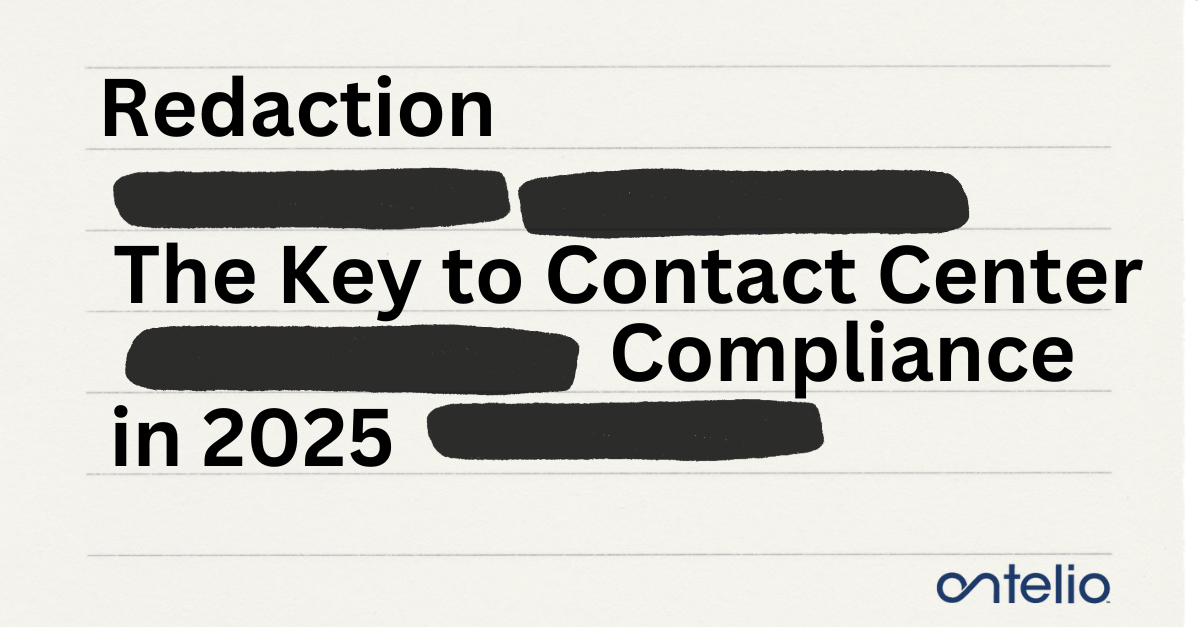Redact Call Recordings for AI Model Training: The Industry Best Practice for Regulatory Compliance
In the age of AI and data-driven insights, businesses face the dual challenge of leveraging vast amounts of data for customer experience (CX)...
5 min read
Marcel Fournier Jul 29, 2024 8:52:36 AM

Contact centers have become the nexus of customer data exchange, handling sensitive information that ranges from personal identifiers to financial details. The imperative to protect this data has never been more pronounced, with redaction standing at the forefront of this endeavor. In this detailed exploration, we delve into the nuances of redaction, its escalating importance in the current landscape, and the sophisticated techniques employed in modern contact centers. This comprehensive overview is vital for understanding how redaction not only complies with the legal framework but also fortifies customer trust and loyalty. As data breaches become more sophisticated, the need for robust redaction processes becomes a critical aspect of operational integrity, transcending beyond mere legal compliance into the realm of ethical responsibility and brand reputation management.
Redaction in contact centers is a vital process involving the censoring or obscuring of sensitive information in recorded communications. As contact centers in 2025 grapple with a vast array of data forms, redaction has become increasingly sophisticated, adapting to various data formats and communication channels. This section delves into the complexities and necessities of redaction, focusing on its role in safeguarding privacy without disrupting the integrity of customer service and data utility.
The necessity of redaction in contact centers has been magnified in 2025, primarily driven by the dual forces of increased regulatory scrutiny and heightened public awareness about data privacy. The risks associated with mishandling customer data have never been higher, encompassing not just legal and financial repercussions but also severe damage to brand reputation. In an age where customer loyalty is closely tied to trust in data handling, failing to adequately redact sensitive information can lead to loss of customer trust and business. Moreover, the legal landscape has evolved to impose stiffer penalties and broader definitions of what constitutes sensitive data. This has extended the scope of redaction, necessitating a proactive approach that anticipates potential privacy concerns. Effective redaction strategies must now account for a myriad of data types and privacy scenarios, ensuring compliance across different jurisdictions with varying data protection laws. This section will delve deeper into the implications of these changes, illustrating how redaction has become an indispensable part of the data governance framework in contact centers.
The year 2024 has seen a paradigm shift in data privacy laws, with more countries adopting stringent regulations akin to the European Union's General Data Protection Regulation (GDPR) and the California Consumer Privacy Act (CCPA). These laws have expanded the definition of personal data, introduced stricter consent requirements, and heightened the accountability of organizations in handling customer data. For contact centers, this has translated into a comprehensive overhaul of data handling practices, with redaction being a key component. The complexity lies not only in adhering to these laws but also in navigating the nuances of regional variations. For instance, some jurisdictions may have stricter requirements for certain types of data or specific consent mechanisms for recording customer interactions. This section will provide an in-depth analysis of how these evolving laws impact redaction practices in contact centers, highlighting the need for a dynamic and adaptable approach to comply with these diverse and evolving regulations.
California: The amended California Consumer Privacy Act (CCPA) regulations, which were delayed and are set to take effect on March 29, 2024, cover a range of topics from data subject requests to dark patterns. Additionally, California proposed regulations covering major new topics like privacy risk assessments, cybersecurity audits, and artificial intelligence.
Colorado: Colorado has selected the Global Privacy Control (GPC) as the first universal opt-out mechanism, which companies must recognize by July 1, 2024.
Florida: Florida’s Digital Bill of Rights, effective July 1, 2024, is unique in its scope and primarily applies to large businesses in the digital space. It emphasizes privacy principles like transparency, accountability, and data minimization, and includes provisions related to minors and government-directed content moderation.
Oregon: The Oregon Consumer Privacy Act, taking effect on July 1, 2024, applies to a broad range of businesses and includes no revenue threshold. It guarantees consumers various privacy rights and requires businesses to implement reasonable safeguards and conduct data protection assessments.
Texas: The Texas Data Privacy and Security Act, effective July 1, 2024, broadly applies to any business operating in Texas or providing services to Texas residents. It promises consumers numerous privacy rights and mandates comprehensive privacy notices and reasonable safeguards.
Montana: Montana’s Consumer Data Privacy Act, becoming law on October 1, 2024, applies to businesses operating in Montana or targeting its residents. It establishes consumer privacy rights and requirements for businesses, similar to other state laws.
Washington: Washington State’s My Health My Data Act, with additional requirements effective March 1, 2024, is focused on health data and applies broadly to any entity conducting business in Washington or providing services to its consumers.
In response to the demanding requirements of 2025's data privacy landscape, contact centers have embraced a range of advanced redaction techniques. These methods leverage cutting-edge technologies such as machine learning, natural language processing, and speech recognition to identify and redact sensitive information with precision and efficiency. One notable advancement is the use of context-aware redaction algorithms that understand the nuances of conversation, enabling more accurate identification of sensitive information. Another significant development is real-time redaction, which allows contact centers to mask sensitive data as it is being spoken or typed, greatly reducing the risk of data exposure. This section will explore these technologies in detail, examining their capabilities, limitations, and their integration into contact center operations. Additionally, the challenges of implementing these advanced techniques, such as the need for continuous algorithm training and balancing data security with customer experience, will be discussed.
The challenge of redacting data in contact centers is not just about removing sensitive information; it's about preserving the utility of the data for business insights and decision-making. In 2025, this balance has become more critical as data-driven strategies play a central role in enhancing customer experience and operational efficiency. Advanced redaction techniques now need to be smart enough to differentiate between data that is crucial for analytical purposes and data that poses a privacy risk. This involves not only technological sophistication but also a deep understanding of business processes and customer interaction dynamics. The goal is to develop redaction processes that are seamless, ensuring that valuable insights can be extracted from customer interactions without compromising individual privacy. This section will delve into the strategies and technologies that enable this balance, discussing how they are implemented in real-world scenarios and the impact they have on business outcomes.
As we look towards the future of data privacy and security in contact centers, Ontelio's redaction solution emerges as a pivotal tool in ensuring compliance and building customer trust. Ontelio, with its advanced AI-driven capabilities, is adept at navigating the complex landscape of 2025's data privacy regulations. It offers a seamless integration into existing contact center operations, providing real-time, context-aware redaction that is both efficient and effective. With Ontelio, contact centers can confidently handle sensitive customer data, knowing that it is protected against unauthorized access and breaches. The solution's adaptability to evolving legal requirements and its ability to balance data utility with privacy makes it an indispensable asset for contact centers aiming to maintain compliance and uphold their reputation in the market. In a world where data security is paramount, Ontelio's commitment to delivering solutions that not only meet the current needs but also anticipate future challenges in data privacy and protection.

In the age of AI and data-driven insights, businesses face the dual challenge of leveraging vast amounts of data for customer experience (CX)...

As data privacy regulations evolve and expand globally, Chief Privacy Officers (CPOs) in contact centers confront the challenging task of adhering to...

Contact centers must efficiently manage vast amounts of customer interactions while ensuring compliance with strict data privacy regulations. AI...